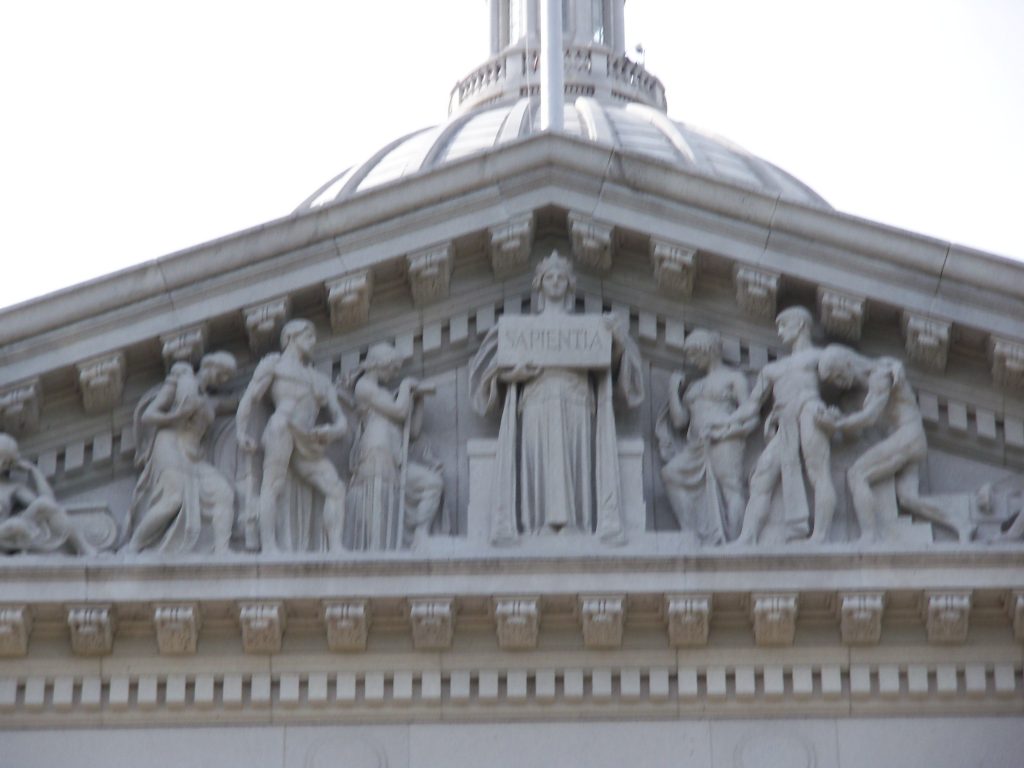Wisconsin Capitol Facade.
Monday, 18 March 2024
“I think myself happy, King Agrippa, because today I shall answer for myself before you concerning all the things of which I am accused by the Jews, Acts 26:2
Note: You can listen to today’s commentary courtesy of our friends at “Bible in Ten” podcast. (Click Here to listen)
You can also read this commentary, scrolling with music, courtesy of our friends at “Discern the Bible” on YouTube. (Click Here to listen), or at Rumble (Click Here to listen).
The NKJV reverses the order of the words, thus confusing the flow of thought. A literal translation would be, “Concerning all which I am accused by Jews, King Agrippa, I have deemed myself blessed before you, being about to defend myself today” (CG).
In the previous verse, Paul was given the right to speak to the gathered council. From there, he stretched out his hand to do so. With that, he begins his words, saying, “Concerning all which I am accused by Jews, King Agrippa.”
There is no article before “Jews.” He makes an overall statement about any Jew who has come forth to make an accusation against him, and any others who might find fault in him at any point in time.
His words indicate that he is not an enemy of his own people in any way, shape or form. This is especially pertinent because Agrippa is a Jew. Paul’s people have united against him, but their stand has no merit. Having said that, he continues his opening address, saying, “I have deemed myself blessed before you.”
His words demonstrate a cheerfulness that ran through him, as if a man who knew that this trial had no bearing on his final destiny. Instead, it was merely a way-station on the way to his desired evangelism in Rome. And even that was only a small portion of the race he was running on his way back to Christ who had appeared to Him on the road to Damascus.
All of this brought about a sense of joy that he could convey in his words to Agrippa. He was prepared to convey his thoughts to those he stood before, but especially Agrippa. With that stated, he next tells why he felt so blessed. He says this came about because he was “being about to defend myself today.”
A defense is exactly what he would be giving. Both in verse 1 and 2, the word apologeomai is used. It is His apologetic discourse which concerned the charges mentioned in Acts 24:5, 6, and which he had already answered on several occasions. In fact, the term apologeomai was used in Acts 24:10 when he first defended himself before Felix two years earlier.
His speech now will carry the same general substance that it did when he stood on the stairs in Jerusalem in Acts 22, but there will be less of a defense concerning apostasy and it will be more directed to his commission as an apostle and the divine assistance he received along the way.
Life application: To this day, Paul is maligned by his own people. The stain of being some type of heretic has been multiplied throughout the millennia so that, like Jesus, he is considered an absolute pariah to those who refer to him and his writings.
But, surprisingly, there are those who claim they follow Jesus and yet they reject Paul and his writings. What this means is that they are following “another Jesus” (2 Corinthians 11:4), and they have believed a different, meaning a false, gospel (Galatians 1:6-8). Adherents to this type of doctrine pick which books of the Bible they will adhere to or even which parts of books (such as Acts) they will accept.
They have, in their own deluded thinking, become the arbiters of God’s word. This is a sad place to be. But it is actually not as uncommon as it might seem. Their ideas are extreme and obviously false, but the same is true with any teaching that ignores even a single prescriptive precept.
For example, the pastoral epistles are clear and explicit about who can be a pastor or deacon and who is excluded. And yet, those prescriptive precepts are ignored by innumerable denominations and churches. Is that stand really any different than that of those who reject any of Paul’s writings? It may be less extreme, but it is still a pick and choose methodology that is harmful to the church.
Once any part of Scripture is taken out of its proper context we begin to fall into error. Let us be people who carefully consider context. Once the context is understood, we must then willingly be obedient to the precepts set forth within that context. In this, we will be people whose doctrine and adherence to that doctrine is fully pleasing to God.
Glorious Lord God, may we carefully and meticulously consider Your word as we read and study it. From there, may we apply its precepts to our lives in the manner which You have determined for us. May we rest in the grace of our Lord and Savior, never assuming that we can do better than He did by reinserting the law which He alone fulfilled and annulled. To Your glory, we pray. Amen.

